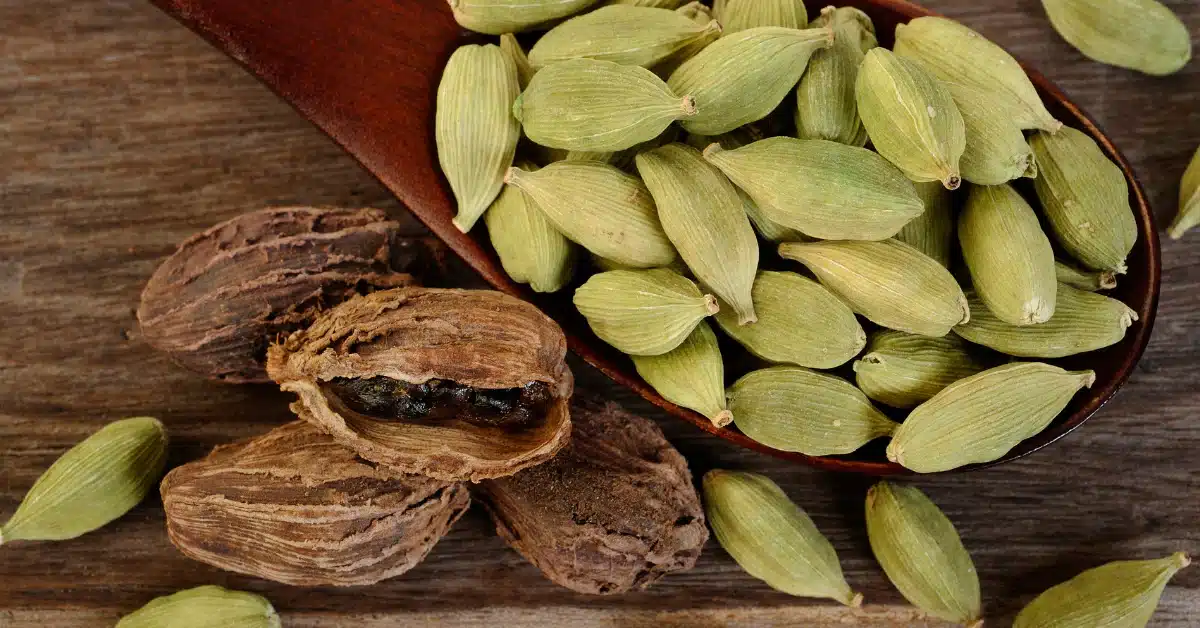Blog
What does cardamom in coffee do?

The Origin of Cardamom Coffee
The tradition of infusing coffee with cardamom has deep historical roots, particularly in Middle Eastern and South Asian cultures. Cardamom, known as the “Queen of Spices,” was highly prized for its exotic aroma and flavor, making it a natural candidate for enhancing the experience of coffee.
In the Middle East, a region renowned for its coffee culture, cardamom coffee is a staple. Known as “Gahwa” or “Qahwa,” this aromatic brew combines finely ground Arabica or Robusta coffee beans with freshly crushed cardamom pods. The result is a fragrant, invigorating drink that plays a central role in social gatherings and hospitality.
Flavor Dynamics
The marriage of cardamom and coffee creates a complex symphony of flavors. Cardamom’s sweet, citrusy, and slightly spicy notes complement the robust, bitter profile of coffee. The result is a harmonious blend that appeals to a wide range of palates. The sweetness of cardamom can balance the bitterness of the coffee, making it more approachable for those new to the world of coffee.
Culinary Significance
Beyond its delightful taste, cardamom coffee has cultural and culinary significance. It’s not just a beverage; it’s a symbol of hospitality, tradition, and connection. In many Middle Eastern and South Asian households, serving cardamom coffee to guests is a gesture of warmth and respect. It’s a symbol of sharing and building relationships.
Health Benefits
Cardamom coffee offers not only a delightful sensory experience but also potential health benefits. Cardamom itself is known for its digestive properties and is often used to alleviate digestive discomfort. When combined with coffee, it can mitigate some of the potential side effects of caffeine, such as stomach upset. Additionally, cardamom is rich in antioxidants and may offer various health benefits when consumed regularly.
Regional Variations
The way cardamom coffee is prepared and enjoyed varies from region to region. In the Middle East, it’s often prepared as a strong, dark brew, served in small cups. In South Asia, particularly in India, it’s known as “Elaichi Chai” (cardamom tea), where cardamom pods are used to infuse the flavor into milk tea. The balance between coffee and cardamom can also vary, allowing for customization according to individual preferences.
Rituals and Traditions
The preparation and consumption of cardamom coffee are steeped in rituals and traditions. In Middle Eastern cultures, it’s customary to serve cardamom coffee to guests as a sign of welcome. The coffee is often accompanied by dates or other sweets. In some regions, the host pours the coffee from a traditional coffee pot with a long, curved spout, adding a touch of theater to the experience.
Coffee Houses and Modern Trends
In recent years, cardamom coffee has found its way into modern coffee houses and cafes around the world. Baristas and coffee enthusiasts experiment with various brewing methods and presentation styles to offer a unique twist on the traditional beverage. Cardamom-infused lattes, cappuccinos, and even iced coffee variations have become popular choices on coffee shop menus.
Cultural Significance
The cultural significance of cardamom coffee extends beyond its taste. It’s a symbol of cultural identity and a connection to ancestral roots. For many individuals, particularly those from the Middle East and South Asia, a cup of cardamom coffee is not just a beverage but a bridge to their heritage and a reminder of cherished traditions.
Aromatic Influence
The aromatic qualities of cardamom are a significant contributor to its success in coffee. As coffee beans are ground and brewed, they release their own rich, earthy aroma. When cardamom is added to the mix, it enhances this aroma, infusing the air with its sweet and spicy notes. The result is not just a beverage but an olfactory experience that begins as soon as you start grinding the coffee beans.
Balance of Flavors
The combination of coffee and cardamom is all about achieving a delicate balance of flavors. While coffee provides the bold, bitter notes, cardamom introduces a layer of complexity with its sweetness and spice. Achieving the perfect balance is an art, and it varies from cup to cup, depending on personal preference.
Coffee Varieties
The type of coffee used can greatly influence the overall flavor of cardamom coffee. Arabica beans, known for their mild acidity and nuanced flavors, are often preferred for this preparation. However, some prefer the stronger, more robust taste of Robusta beans when combined with cardamom, as it can create a bolder cup of coffee.
Presentation and Serving
The presentation of cardamom coffee varies across cultures. In the Middle East, it’s often served in small, ornate cups without handles, encouraging sippers to enjoy the beverage slowly and savor its flavors. In contrast, in South Asia, cardamom tea (Elaichi Chai) is served in larger cups with handles. The presentation reflects cultural norms and preferences.
Cardamom Varieties
Just as there are different coffee varieties, there are also various types of cardamom. The most commonly used varieties are green and black cardamom. While both can be used in cardamom coffee, green cardamom is favored for its sweeter, more floral notes, while black cardamom provides a smokier, earthier flavor.
Cardamom Coffee Around the World
While cardamom coffee has strong roots in Middle Eastern and South Asian cultures, it has also found its way into other parts of the world. In Scandinavian countries like Sweden and Finland, cardamom-infused coffee is a holiday tradition, particularly during Christmas. The aromatic blend of spices and coffee warms the soul during the cold winter months.
Health Benefits and Wellness
Beyond its delightful taste, cardamom coffee is embraced for its potential health benefits. Cardamom is rich in antioxidants, which may help protect the body from oxidative stress. Additionally, it has anti-inflammatory properties that could offer relief from various ailments. When combined with coffee, it can provide a comforting and wellness-promoting beverage.
Contemporary Trends
In recent years, cardamom coffee has experienced a resurgence in popularity, thanks in part to the growing interest in specialty coffee. Coffee aficionados and baristas are exploring creative ways to incorporate cardamom into espresso-based drinks like lattes and cortados. It’s not uncommon to find cardamom-infused syrups and coffee blends in specialty coffee shops.
Cultural Preservation
As global food trends evolve, there is a renewed effort to preserve and celebrate cultural traditions. Cardamom coffee is one such tradition that remains relevant, bridging the gap between generations and connecting people to their cultural heritage. It’s a testament to the enduring power of flavors and the stories they carry.
Cardamom coffee is more than a beverage; it’s a journey through time and culture. It captures the essence of tradition while adapting to modern tastes and preferences. Whether enjoyed in the bustling streets of Istanbul, the serene coffeehouses of Dubai, or the cozy cafes of Stockholm, cardamom coffee remains a symbol of connection, conversation, and the joy of sipping life’s moments.
In the world of coffee, the addition of cardamom creates a sensory journey that transcends mere taste. It’s a fusion of flavors, a symbol of hospitality, and a connection to rich cultural traditions. Whether enjoyed in a Middle Eastern coffeehouse, a South Asian home, or a modern café, cardamom coffee offers a unique and aromatic experience that elevates the simple act of sipping a cup of coffee to a cultural and culinary celebration.
FAQ:
- What is cardamom coffee, and how is it made?
- Cardamom coffee is a beverage made by adding cardamom to coffee during brewing. It can be made by mixing ground cardamom with coffee grounds or by adding whole cardamom pods to the coffee.
- What does cardamom add to the flavor of coffee?
- Cardamom adds sweet, spicy, and citrusy notes to coffee, enhancing its aroma and creating a more complex and balanced flavor profile.
- Is cardamom coffee sweet or bitter?
- Cardamom coffee can be both sweet and bitter, depending on the balance of coffee and cardamom used. The sweetness of cardamom can balance the bitterness of coffee.
- Is cardamom coffee a traditional drink in any culture?
- Yes, cardamom coffee is a traditional drink in Middle Eastern and South Asian cultures, where it is often served to guests as a sign of hospitality.
- Can I use ground cardamom in my coffee, or do I need whole pods?
- You can use ground cardamom for convenience, but some prefer the aromatic intensity of whole cardamom pods. It’s a matter of personal preference.
- Are there any health benefits to drinking cardamom coffee?
- Cardamom is rich in antioxidants and has potential health benefits, such as aiding digestion and reducing inflammation. When added to coffee, these benefits may be enhanced.
- What types of coffee beans are best for cardamom coffee?
- Arabica beans are often preferred for cardamom coffee due to their mild acidity and nuanced flavors. However, some enjoy the boldness of Robusta beans with cardamom.
- Can cardamom coffee be served cold or as an iced drink?
- Yes, cardamom coffee can be served cold or as an iced drink. It offers a refreshing twist on traditional hot coffee.
- Are there any modern variations or recipes for cardamom coffee?
- Yes, modern variations include cardamom-infused lattes, cappuccinos, and even cardamom coffee cocktails. Baristas and coffee enthusiasts experiment with creative recipes.
- Is cardamom coffee a caffeinated beverage?
- Yes, cardamom coffee contains caffeine, as it is typically made with regular coffee beans. However, the caffeine content may vary depending on the coffee-to-cardamom ratio.



